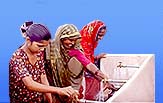/topics/panchayati-raj-institutions
Panchayati Raj Institutions
A perspective of watershed development in the central Himalayan state of Uttarakhand – A paper by Malavika Chauhan
Posted on 25 May, 2011 08:23 AMIt traces the historical growth of thinking on watershed in the region, and highlights issues and influences. Impacts and benefits are discussed in relation to sustainability. The review shows that success in these projects is usually isolated, mostly seen in small micro-watersheds with naturally good water harvesting conditions.
Operation and maintenance for rural water supplies – A manual by Department of Drinking Water and Sanitation and the Water and Sanitation Program of World Bank
Posted on 17 Apr, 2011 07:23 AM This Operation and Maintenance (O&M) manual for rural water supplies by the Department of Drinking Water And Sanitation and Water and Sanitation Program of the World Bank complements their Gram Panchayat Handbook released in 2010 . It takes into account the current aspirations and challenges facing the sector, and builds on the framework already set out in the National Rajiv Gandhi Drinking Water Programme (NRDWP) and Strategic Plan 2011-2022.
This Operation and Maintenance (O&M) manual for rural water supplies by the Department of Drinking Water And Sanitation and Water and Sanitation Program of the World Bank complements their Gram Panchayat Handbook released in 2010 . It takes into account the current aspirations and challenges facing the sector, and builds on the framework already set out in the National Rajiv Gandhi Drinking Water Programme (NRDWP) and Strategic Plan 2011-2022.
Water pollution in villages - A post in Hindi by Ram Naresh Kumar and Sanjay Singh
Posted on 05 Apr, 2011 02:49 PMगांवों में जल प्रदुषण
Water management through communities in Uttarakhand - Neelima Garg
Posted on 28 Mar, 2011 06:36 PMThe conflict is over how water is perceived, valued and treated. Water is life savior elixir. The importance of water as a vital resource to the life system and an essential component of societal development cannot be over emphasized. Over the years, many ancient civilizations emphasized on various mechanisms of water collection & distribution.
MGNREGA completes 5 years - PIB Release
Posted on 03 Feb, 2011 01:34 PMAddressing a large gathering at Vigyan Bhawan on this occasion in New Delhi, the Prime Minister Dr. Manmohan Singh called upon the states to strengthen the Gram Sabhas for rural empowerment. He said the Ministry of Rural Development and Ministry of Panchayati Raj has jointly chalked out a plan to strengthen the Panchayats. Technical Units will be set up in Gram Panchayats and to improve the managerial efficiency every unit will have a Panchayat Development officer and one Junior Engineer. Focus would be on Left Wing Extremism(LWE) affected districts and the districts where more than Rs.100 crore have been spent under MGNREGA.
"Recommendations on water and sanitation services to urban poor"
Posted on 02 Feb, 2011 05:31 PMThe India WASH Forum newsletter for January 2011. It is an open platform for engagement on contemporary issues, for an independent credible voice in the water, sanitation and hygiene sector.
- Recommendations on water and sanitation services to urban poor
The group came up with a list of prioritised issues that need immediate attention if the urban poor were to be provided with sustainable and equitable water and sanitation services. - Water resources are under stress of depletion as well as denial of access for the poor
Drinking water needs are met primarily from ground water. Except for the large metros that suck away water from rivers, most small towns in India depend on ground water supply.
Ensuring sustainable drinking water security in rural areas - PIB Release
Posted on 28 Jan, 2011 04:40 PM Hitherto the role of the government was that of a service provider, with minimum involvement of the community in the planning process and the implementation activities. With the increase in demand due to public aspirations and decrease of availability of safe water it was considered essential to involve the community in the programme.
To achieve this, there was a paradigm shift and the Framework for implementation of National Rural Drinking Water Programme was revised in 2009. The Department appropriately addressed the soft issues related to facilitating the active participation of PRIs in the process of planning, implementation and operation of schemes to achieve the goal of long term sustainability. It also ensured that the community gets continuous support and handholding so that they are empowered to take up the role of planning and implementing the systems also in addition to operating and maintaining them.
Managing Natural Resources -A report by IDSAsr
Posted on 18 Jan, 2011 04:24 PMThe scarcity value of natural resources has risen due to rising pressure of human population and demands made by modern economics progress. As such managing these resources has become very important.
Blueprint for farm growth
Posted on 28 Dec, 2010 03:12 PM
Since the start of the 11th Five Year Plan, the growth rate in agriculture has virtually remained stagnant. A scene at a paddy field in the outskirts of Hyderabad.
Rainfed areas and rice farming Crucial agricultural water issues
Posted on 25 Dec, 2010 08:30 PMJohn Thompson works on power, policy and sustainability issues in food and agriculture, water resource management and rural development. He is a STEPS Centre member, IDS Fellow and joint Co-ordinator of the Future Agricultures Consortium. He presents two crucial agricultural water issues to take priority on World Water Day.





